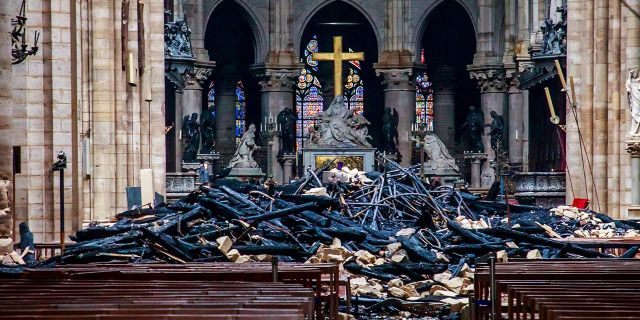An Easter Message from Bishop Gibbs
Understanding What is Church and What is Death
Brothers and Sisters in Christ,
In my travels, it seems that I am always being asked, “Bishop, is the church dying?” Of course, the first thing I want to say is, “God, I hope so.” But of course, nobody understands that response, so I have to temper it because they might think that I want the church to die. That’s because there is confusion about what is “Church,” and about what is “death”. As church people, we know, we profess, we embrace, we preach, we proclaim that death leads to life.
Now, I’m not suggesting that the next time that someone asks you if the church is dying that you say, “You betcha!” You might want to think about how you would answer this question for yourself. My tempered answer to this question is usually, “You know, WE are the church. Not this wonderful building.” Of course, in these past few days, this particular point has become even more poignant. We must take a moment to mourn the loss of Notre Dame. However, it is a building, and as glorious and magnificent as it is, it was built to point us to God. It was built to bring us in community to Jesus and just because there are fewer stones left on top of one another, does not mean the church is dead. It means a building is partially destroyed. But there was a sign of life even amidst that destruction.

Death leads to life. It’s a bit of a struggle for most people to understand that. For me, I go back to my sense of what it is about the church and its death that brings me hope. The other message that I’ve heard over the years is, “Bishop, you should have been here when all the pews were full every Sunday!” My response has been, “Really? Every Sunday?” The problem with that notion is that we have honestly come to a place where we believe that that WAS the church. I was even told that the Episcopal Church in the Diocese of Michigan had 34 churches in just the city of Detroit. There is no way you can convince me that every single one of them was full every single Sunday.
Unfortunately, when we talk about building up the church, inspiring God’s people to live into their Baptismal Covenant, the memory we are building toward is that false memory that the churches were always full every Sunday, and we approach our future based on that myth. When we can’t face the truth, we can’t get anywhere. We must ask ourselves, do we really need full pews or do we need more faithfulness in the people that we have with us today?
When I think about the church dying, it’s these notions of church that need to die. When that church can die, there can be new life. As an institutional geek, I happen to like the ritual, the rules and the procedures; I think it works for us as a people. But, the problem with geekiness about church is that suddenly the rules become the church, and then you can’t even get communion on Sunday morning unless you follow exact procedures. When that notion of the church dies, I submit, there will be new life. There will be resurrection. But certain notions of the church have to die.
But, that does not excuse the church. We tend to worry about getting things “right” in worship, genuflecting at the right time, making the sign of the cross the right number of times, but that’s not the alpha and the omega of being church. That part of the church needs to die, too. I love the ritual of church, but when the ritual becomes the church, we have lost everything. Ministry is not about us, it’s about Jesus. We want to please people, and by pleasing people, they like us. When they like us, we want to please them some more, but that’s not why we were called to this. We are just instruments. Faithful instruments, I hope, but instruments set on the path to point past ourselves and toward Jesus.
There is dying that has to happen in the clergy of the church and the people who are the church. We have to give up these notions that this is about making ourselves comfortable and others happy. We have to get rid of those things that put “me” first, and we must allow Jesus to be in first place. In death there is new life. Jesus said so, look to the Gospel. Unless we slough off that which we are tightly grasping, unless we can give all of our lives to Jesus, then nothing we do brings new life.
What in you needs to die so that we can live in Jesus? I pray that each of us individually and within our worship communities and in the work we do together, we find more and more ways for those old notions to die so that we might live for Jesus.
For twenty years, I have asked each church in this Diocese two questions, and I will leave you with the same ones: Why are you here? Who would miss you if you were gone?
Answer this and there will be death, but there will also be new life.
+Bishop Gibbs

